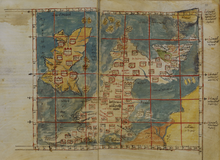Albion
Albion (in Ptolemy's Ἀλουίων , Alouion ) is an ancient name for Great Britain , although the term is mostly related to England . The term is also used poetically for England in modern times.
The name may be Celtic origin, the Romans him from the White Cliffs of Dover , starting with Latin albus ( "white") joined and A. Holder ( Alt-Celtischer vocabulary , 1896) it simply with white country translated. A corresponding Celtic word for "white" is not known, however, which makes this derivation appear problematic. Another possibility would be the developed Celtic root * albio- ("world", "country"). The Alps , Albanians and Alba , the Scottish Gaelic word for Scotland , in Irish Albain , go back to one of these versions .
The early historians (6th century BC) did not use the name Britannia and instead spoke of nesos Iernon kai Albionon (Island of the Ierni and Albiones). Pytheas of Massalia (4th century BC) therefore spoke of Albion and Ierne . Based on the fact that there was a tribe called Albiones on the northern coast of Spain near Asturias , some scholars had also settled Albion in this area (G. F. Unger, Rhein. Mus. Xxxviii, 1883, pp. 156-196). The name Albion was picked up by later scholars of classical antiquity such as Pliny the Elder (Natural History 4,102) and Ptolemy .
Perfidious Albion
The standing expression " perfidious Albion" (English perfidious Albion , French la perfide Albion ) for the alleged underhandedness of British foreign policy comes from the poem L'Ère des Français by the French poet and playwright Augustin Louis de Ximénès (1728-1817), written in 1793 , but also appears earlier with Jacques Bénigne Bossuet . The formulaic phrase was later adopted by François-René de Chateaubriand , Gustave Flaubert , Théodore de Banville , Edmond and Jules de Goncourt , Anatole France and Christophe . In the course of a large-scale recruitment campaign by Napoleon I , it became a household word in 1813 . In the German-speaking world, the expression was used frequently, especially during the Wilhelmine era in Germany - in the context of increasing German-British tensions.
Various historical events were referred to:
- During the Hundred Years War in 1415, at the Battle of Azincourt, the English killed French knights who had already been captured under unknown circumstances.
- Before the beginning of the Seven Years' War , the British captured 300 French merchant ships and imprisoned 6,000 seamen in 1755 without a declaration of war or diplomatic note.
- In 1801 Hyde Parker, together with Nelson, destroyed the Danish fleet in the naval battle of Copenhagen without a declaration of war .
- In 1908, Lord Fisher recommended the ruling King Edward VII to "copy the German fleet". According to Admiral Bacon, “Fisher assumed that if Germany ended its naval program (…) it would attack us; in September or October 1914 because of the completion of the Kaiser Wilhelm Canal (...). The repetition of Copenhagen in 1801 would therefore be recommended: 'Why should we wait and give Germany the advantage of defining the time of attack?' "The king replied that this idea contradicted general law.
During the Second World War, the term was used again by the National Socialist press after the destruction of the French fleet in Mers-el-Kébir by the British. In 1940 Wilhelm von Prussia congratulated Adolf Hitler in a letter on his victory over Holland, Belgium and France, using the words "the way is free for a final settlement with the perfidious Albion".
At the end of 2011, British Vice Prime Minister Nick Clegg ironically referred to the tradition of this term in Franco-English diplomatic disputes .
literature
- Bernhard Maier : Small lexicon of names and words of Celtic origin. CH Beck, Munich 2003, ISBN 3-406-49470-6 .
- Hans-Christof Kraus: English constitution and political thinking in the Ancien Régime, 1689–1789. Oldenbourg, Munich 2006, ISBN 3-486-57908-8 , p. 167.
- Robert Gordon Latham : Britannica insulae . In: William Smith : Dictionary of Greek and Roman Geography. London 1854.
Individual evidence
- ↑ Bernhard Maier: Small lexicon of names and words of Celtic origin. P. 21 f.
- ↑ Poésies révolutionnaires et contre-révolutionnaires Volume 1, Librairie historique, Paris 1821, p. 160
- ^ Bossuet : Premier sermon pour la fête de la circoncision de Notre-Seigneur in: Œuvres complètes de Bossuet Volume 5, Outhenin-Chalandre fils, Paris 1840, p. 264
- ↑ “There is nothing more popular in French politics - it has always been the case and it will always be so - than giving 'perfidious Albion' a good kicking from time to time. At the end of the day, France and Britain have always worked out it is better to work together rather than shout at each other across the channel. " Patrick Wintour: Clegg vows to return Britain to the heart of Europe and the single-market debate. The Guardian , December 16, 2011
